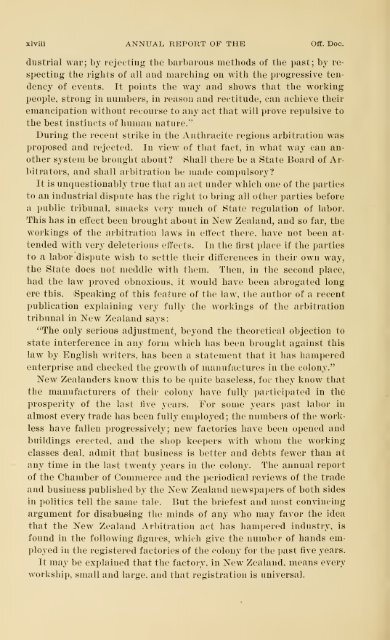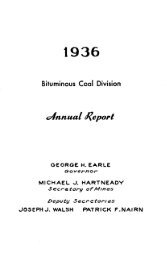- Page 2 and 3:
UniversitybfScjianton Thelitwury ^z
- Page 5:
l^V d f^/^
- Page 9 and 10:
Official Document, No. 11. REPORT B
- Page 11 and 12:
Official Document, No. 11. LETTER O
- Page 13 and 14:
Official Document, No. 11. CONTENTS
- Page 15 and 16:
Official Document, No. 11. REPORT B
- Page 17 and 18: No. 11. BUREAU OF MINES. ix Iii the
- Page 19 and 20: No. 11. BUREAU OF MINES. xi receive
- Page 21 and 22: No. 11. BUREAU OF MINES. xiii year
- Page 23 and 24: No. 11. BUREAU OF MINES. xv doned,
- Page 25 and 26: No. 11. BUREAU OF MINES. xvii [l.'|
- Page 27 and 28: No. 11. BUREAU OF MINES. xix IBjo;
- Page 29 and 30: No. 11. BUREAU OF MINES. xxi oj o f
- Page 31 and 32: No. 11. BUREAU OF MINES. to oo to i
- Page 34 and 35: -mmMM§Bimm
- Page 38 and 39: Co to V) o 6 8 I 99VNQ-Q Sai'N'O'Q
- Page 40 and 41: xxvi ANNUAL REPORT OF THE Off. Doc.
- Page 43: ERRATA. On page xxvii, English spea
- Page 46 and 47: xxviii ANNUAL REPORT OF THE Off. Do
- Page 49 and 50: No II BUREAU OF MINES. xxix a)
- Page 51 and 52: No. 11. BUREAU OF MINES. -
- Page 53 and 54: No. 11. BUREAU OF MINES. xxxill u
- Page 55 and 56: No. 11. BUREAU OF MINES. -
- Page 57 and 58: No. n. BUREAU OF MINES. •a a a>
- Page 59 and 60: Nu. 11. BUREAU OF MINES. £3 c« 3'
- Page 61 and 62: No. 11. BUREAU OF MINES. xli EXPORT
- Page 63 and 64: No. 11. BUREAU OF MINES. xliii the
- Page 65 and 66: No. 11. BUREAU OF MINES. xlv the ba
- Page 67: No. 11. BUREAU OF MINES. xlvii a co
- Page 71 and 72: No. 11. BUREAU OF MINES. 11 imparti
- Page 73 and 74: ' No. 11. BUREAU OF MINES. liii S3
- Page 75 and 76: No. 11. BUREAU OF MINES. Iv wn t o)
- Page 77 and 78: No. 11. BUREAU OF MINES. lvil
- Page 79 and 80: No. 11. BUREAU OF MINES. lix M M i-
- Page 81 and 82: No. 11. BUREAU OF MINES. lxl «fi V
- Page 83 and 84: No. 11. BUREAU OF MINES. lxlii o 'u
- Page 85 and 86: No. 11. BUREAU OF MINES. lxv O
- Page 87 and 88: No. 11. BUREAU OF MINES. lxvii
- Page 89 and 90: No. 11. BUREAU OF MINES. Ixix 'sjos
- Page 91 and 92: No. 11. BUREAU OF MINES. lxxi uoss-
- Page 93 and 94: No. 11. BUREAU OF MINES. lxxiii TAB
- Page 95 and 96: ) LAWS RELATING Coal Mining ( lxxv
- Page 97 and 98: Official Document, No. 11. LAWS REL
- Page 99 and 100: No. 11. MINING LAWS OF PENNSYLVANIA
- Page 101 and 102: No. 11. MINING LAWS OF PENNSYLVANIA
- Page 103 and 104: No. 11. MINING LAWS OF PENNSYLVANIA
- Page 105 and 106: No. 11. MINING LAWS OF PENNSYLVANIA
- Page 107 and 108: No. 11. MINING LAWS OF PENNSYLVANIA
- Page 109 and 110: No. 11. MINING LAWS OF PENNSYLVANIA
- Page 111 and 112: No. 11. MINING LAWS OF PENNSYLVANIA
- Page 113 and 114: No. 11. MINING LAWS OF PENNSYLVANIA
- Page 115 and 116: No. 11. MINING LAWS OF PENNSYLVANIA
- Page 117 and 118: No. 11. MINING LAWS OF PENNSYLVANIA
- Page 119 and 120:
Nu. 11. MINING LAWS OF PENNSYLVANIA
- Page 121 and 122:
No. 11. MINING LAWS OF PENNSYLVANIA
- Page 123 and 124:
No. 11. MIXING LAWS OF PENNSYLVANIA
- Page 125 and 126:
No. 11. MINING LAWS OF PENNSYLVANIA
- Page 127 and 128:
No. 11. MINING LAWS OF PENNSYLVANIA
- Page 129 and 130:
No. 11. MINING LAWS OF PENNSYLVANIA
- Page 131 and 132:
No. 11. MINING LAWS OF PENNSYLVANIA
- Page 133 and 134:
No. 11. MINING LAWS OF PENNSYLVANIA
- Page 135 and 136:
No. 11. MINING LAWS OF PENNSYLVANIA
- Page 137 and 138:
No. 11. MINING LAWS OF PENNSYLVANIA
- Page 139 and 140:
No. 11. MINING LAWS OF PENNSYLVANIA
- Page 141 and 142:
No. 11. MINING LAWS OF PENNSYLVANIA
- Page 143 and 144:
No. 11. MINING LAWS OF PENNSYLVANIA
- Page 145 and 146:
No. 11. MINING LAWS OF PENNSYLVANIA
- Page 147 and 148:
No. LI. MINING LAWS OF PENNSYLVANIA
- Page 149 and 150:
No. 11. MINING LAWS OP PENNSYLVANIA
- Page 151 and 152:
No. 11. MINING LAWS OF PENNSYLVANIA
- Page 153 and 154:
No. 11. MINING LAWS OF PENNSYLVANIA
- Page 155 and 156:
No. 11. MINIXt; LAWS OF PENNSYLVANI
- Page 157 and 158:
No. 11. MINING LAWS OP PENNSYLVANIA
- Page 159 and 160:
No. 11. MINING LAWS OF PENNSYLVANIA
- Page 161 and 162:
No. 11. MINING LAWS OF PENNSYLVANIA
- Page 163 and 164:
No. 11. MINING LAWS OF PENNSYLVANIA
- Page 165 and 166:
No. 11. MINING LAWS OF PENNSYLVANIA
- Page 167 and 168:
No. 11. MINING LAWS OF PENNSYLVANIA
- Page 169 and 170:
No. 11. MINING LAWS OF PENNSYLVANIA
- Page 171 and 172:
No. 11. MINING LAWS OF PENNSYLVANIA
- Page 173 and 174:
No. 11. MINING LAWS OF PENNSYLVANIA
- Page 175 and 176:
No. 11. MINING LAWS OF PENNSYLVANIA
- Page 177 and 178:
No. 10. MINING LAWS OF PENNSYLVANIA
- Page 179 and 180:
No. 10. MINING LAWS OF PENNSYLVANIA
- Page 181 and 182:
Official Document, No. 11. First An
- Page 183 and 184:
I No. 11. FIRST ANTHRACITE DISTRICT
- Page 185 and 186:
No. 11. FIRST ANTHRACITE DISTRICT.
- Page 187 and 188:
No. 11. FIRST ANTHRACITE DISTRICT.
- Page 189 and 190:
' l. * z,- No. 11. FIRST ANTHRACITE
- Page 191 and 192:
No. 11. FIRST ANTHRACITE DISTRICT.
- Page 193 and 194:
No. 11. FIRST ANTHRACITE DISTRICT.
- Page 195 and 196:
V : m No. n FIRST ANTHRACITE DISTRI
- Page 197 and 198:
No. 11. FIRST ANTHRACITE DISTRICT.
- Page 199 and 200:
No. 11 FIRST ANTHRACITE DISTRICT. 1
- Page 201 and 202:
: * ; , ,• ^ — No. 11. FIRST AN
- Page 203 and 204:
. > vi . I £ . CS^-a No. 11. S** v
- Page 205 and 206:
No. 11 FIRST ANTHRACITE DISTRICT. 2
- Page 207 and 208:
No. 11 FIRST ANTHRACITE DISTRICT. 2
- Page 209 and 210:
. : = li ' ' No. 11. FIRST ANTHRACI
- Page 211 and 212:
Official Document, No. 11. Second A
- Page 213 and 214:
No. 11. SKO >NI) ANTHUAC1TE DISTRIC
- Page 215 and 216:
No. 11. SECOND ANTHRACITE DISTRICT.
- Page 217 and 218:
No. 11. SECOND ANTHRACITE DISTRICT.
- Page 219 and 220:
No. 11 SECOND ANTHRACITE DISTRICT.
- Page 221 and 222:
N... 11. SECOND ANTHRACITE DISTRICT
- Page 223 and 224:
I No. 11. SECOND ANTHRACITE DISTRIC
- Page 225 and 226:
No 11. SECOND ANTHRACITE DISTRICT.
- Page 227 and 228:
No. 11. SECOND ANTHRACITE DISTRICT.
- Page 229 and 230:
No. 11. SECOND ANTHRACITE DISTRICT.
- Page 231 and 232:
-WKt-N No. 11. SECOND ANTHRACITE DI
- Page 233 and 234:
: - No 11. SECOND ANTHRACITE DISTRI
- Page 235 and 236:
1 ' 3 « ' - I : « No. 11 SECOND A
- Page 237 and 238:
J No. 11 SECOND ANTHRACITE DISTRICT
- Page 239 and 240:
No. 11. SECOND ANTHRACITE DISTRICT.
- Page 241 and 242:
No. 11. SECOND ANTHRACITE DISTRICT.
- Page 243 and 244:
No. 11 SECOND ANTHRACITE DISTRICT.
- Page 245 and 246:
,. c£cS No 11. SECOND ANTHRACITE D
- Page 247 and 248:
Official Document, No. 11. Third An
- Page 249 and 250:
No. 11. THIRD ANTHRACITE DISTRICT.
- Page 251 and 252:
No 11. THIRD ANTKUAC1TK DISTRICT. 7
- Page 253 and 254:
No. 11. THIRD ANTHRACITE DISTRICT.
- Page 255 and 256:
No. 11. THIRD ANTHRACITE DISTRICT.
- Page 257 and 258:
No. 11. THIRD ANTHRACITE DISTRICT.
- Page 259 and 260:
No. 11. THIRD ANTHRACITE DISTRICT.
- Page 261 and 262:
No. 11. THIRD ANTHRACITE DISTRICT.
- Page 263 and 264:
No. 11. THIRD AN1KRACITE DISTRICT.
- Page 265 and 266:
No. 11. THIRD ANTHRACITE DISTRICT.
- Page 267 and 268:
No. 11. thiim") a nth kacitk distui
- Page 269 and 270:
No. 11. THIRD ANTHRACITE DISTRICT.
- Page 271 and 272:
' . i 3 . . No. 11. THIRD ANTHRACIT
- Page 273 and 274:
No. 11. THIRD ANTHRACITE DISTRICT.
- Page 275 and 276:
No. 11. THIRD ANTHRACITE DISTRICT.
- Page 277 and 278:
I ? , cd No. 11. THIRD ANTHRACITE D
- Page 279 and 280:
3 -- .*. — « m «-> C m tJC 'C .
- Page 281 and 282:
j ' No. 11. THIRD ANTHRACITE DISTRI
- Page 283 and 284:
No. 11. THIRD ANTHRACITE DISTRK T.
- Page 285 and 286:
Official Document, No. 11. Fourth A
- Page 287 and 288:
No 11. FOURTH ANTHRACITE DISTRICT.
- Page 289 and 290:
No. 11. FOURTH ANTHRACITE DISTRICT.
- Page 291 and 292:
No. 11. FOURTH A NT 1 1 RACITE DIST
- Page 293 and 294:
No. 11. FOURTH ANTHRACITE DISTRICT.
- Page 295 and 296:
No. 11. FnTRTH ANTHRACITE DISTRICT.
- Page 297 and 298:
No. 11. FOURTH ANTHRACITE DISTRICT.
- Page 299 and 300:
No. 11. FOURTH ANTHRACITE DISTRICT.
- Page 301 and 302:
No. 11. FOURTH ANTHRACITE DISTRICT.
- Page 303 and 304:
No. 11. FOURTH ANTHRACITE DISTRICT.
- Page 305 and 306:
No. 11. FOURTH ANTHRACITE DISTRICT.
- Page 307 and 308:
No 11. FOURTH ANTHRACITE DISTRICT.
- Page 309 and 310:
o " I No. 11. FOURTH ANTHRACITE DIS
- Page 311 and 312:
No. 11 FOURTH ANTHRACITE DISTRICT.
- Page 313 and 314:
1 No. 11. FOURTH ANTHRACITE DISTRIC
- Page 315 and 316:
• E : , O — No. 11. FOURTH ANTH
- Page 317 and 318:
' : No. 11. FOURTH ANTHRACITE DISTR
- Page 319 and 320:
: r"^ ' : j= i «— No 11. FOURTH
- Page 321 and 322:
| • ; No. 11. FOURTH ANTHRACITE D
- Page 323 and 324:
L — *- ^- CC 1 No. 11. FOURTH ANT
- Page 325 and 326:
. No. n. FOURTH AN'I I/RACITE DISTR
- Page 327 and 328:
No. 11. Ful'I.TIi ANTHRACITE DISTRI
- Page 329 and 330:
No 11. FOURTH ANTHRACITE DISTRICT 1
- Page 331 and 332:
; w ' 2 . • No. 11. FOURTH ANTHRA
- Page 333 and 334:
Official Document, No 11. Fifth Ant
- Page 335 and 336:
No. 11. FIFTH ANTHRACITE DISTRICT.
- Page 337 and 338:
No. 11. FiFTH ANTHRACITE DISTRICT.
- Page 339 and 340:
~ ' No. 11. FIFTH ANTHRACITE DISTRI
- Page 341 and 342:
No 11. FIFTH ANTHRACITE DISTRICT. 1
- Page 343 and 344:
he No. 11. FIFTfl ANTHRACITE DISTRI
- Page 345 and 346:
No 11. FIFTH ANTHRACITE DISTRICT. 1
- Page 347 and 348:
I No. 11. FIFTH -ANTHRACITE DISTRIC
- Page 349 and 350:
No. 11. FIFTH ANTHRACITE DISTRICT.
- Page 351 and 352:
hese No. 11. FIFTH ANTHRACITE DISTR
- Page 353 and 354:
No. 11. FIFTH ANTHRACITE DISTRICT.
- Page 355 and 356:
No. 11. FIFTH ANTHRACITE DISTRICT.
- Page 357 and 358:
No. 11. FIFTH ANTHRACITE DISTRICT.
- Page 359 and 360:
No. 11. FIFTH ANTHRACITE DISTRICT.
- Page 361 and 362:
No. 11. FIFTH ANTHRACITE DISTRICT.
- Page 363 and 364:
No. 11. FIFTH ANTHRACITE DISTRICT.
- Page 365 and 366:
No. 11. FIFTH ANTHRACITE DISTRICT.
- Page 367 and 368:
p 7 No. n. FIFTH ANTHRACITE DISTRIC
- Page 369 and 370:
No. 11. FIFTH ANTHRACITE DISTRICT.
- Page 371 and 372:
: i a No. 11. FIFTH ANTHRACITE DIST
- Page 373 and 374:
No. 11. FIFTH ANTHRACITE DISTRICT.
- Page 375 and 376:
- — . No. 11. FIFTH ANTHRACITE DI
- Page 377 and 378:
No. 11. FIFTH ANTHRACITE DISTRICT.
- Page 379 and 380:
| V I ± " No. 11. FIFTH ANTHRACITE
- Page 381 and 382:
—. w ! 40 No. 11. FIFTH ANTHRACIT
- Page 383 and 384:
: Official Document, No. 11. Sixth
- Page 385 and 386:
No. 11. SIXTH ANTHRACITE DISTRICT.
- Page 387:
pf • L ,.,-,-.
- Page 390 and 391:
208 REPORT OF THE BUREAU OF MINES.
- Page 392:
210 REPORT OF THE BUREAU OF MINES.
- Page 397 and 398:
. A No. 11. SIXTH ANTHRACITE DISTRI
- Page 399 and 400:
No. 11. SIXTH ANTHRACITE DISTRICT.
- Page 401 and 402:
No. 11. SIXTH ANTHRACITE DISTRICT.
- Page 403 and 404:
No. 11. SIXTH ANTHRACITE DISTRICT.
- Page 405 and 406:
No. 11. SIXTH ANTHRACITE DISTRICT.
- Page 407 and 408:
No. 11. SIXTH ANTHRACITE DISTRICT.
- Page 409 and 410:
l-»»o*»l»ti«j.6 ; = . • :*J
- Page 411 and 412:
. No. 11. SIXTH ANTHRACITE DISTRICT
- Page 413 and 414:
I , No. 11. SIXTH ANTHRACITE DISTRI
- Page 415 and 416:
1 No. 11. SIXTH AXTHKACITK DISTKH'T
- Page 417 and 418:
Official Document, No. 11. Seventh
- Page 419 and 420:
7 No. 11. SEVENTH ANTHRACITE DISTRI
- Page 421 and 422:
No. 11. SEVENTH ANTHRACITE DISTRICT
- Page 423 and 424:
No. 11. SEVENTH ANTHRACITE DISTRICT
- Page 425 and 426:
No. 11. SEVENTH ANTHRACITE DISTRICT
- Page 427 and 428:
' : No. 11. SEVENTH ANTHRACITE DIST
- Page 429 and 430:
No. 11. SEVENTH ANTHRACITE DISTRICT
- Page 431 and 432:
I No. 11. SEVENTH ANTHRACITE DISTRI
- Page 433 and 434:
14.90 14.90 21.70 18.20 No. 11. SEV
- Page 435 and 436:
^ • g : i : No. 11. SEVENTH ANTHR
- Page 437 and 438:
! ! 33333 ) ooooo « Be^-Se : o No.
- Page 439 and 440:
Official Document, No. 11. Eighth A
- Page 441 and 442:
No. 11. EIGHTH ANTHRACITE DISTRICT.
- Page 443 and 444:
No. 11. EIGHTH ANTHRACITE DISTRICT.
- Page 445 and 446:
No. 11. EIGHTH ANTHRACITE DISTRICT.
- Page 447 and 448:
No. 11. EIGHTH ANTHRACITE DISTRICT.
- Page 449 and 450:
he No. 11. EIGHTH ANTHRACITE DISTRI
- Page 451 and 452:
No. 11. EIGHTH ANTHRACITE DISTRICT.
- Page 453 and 454:
No. 11. EIGHTH ANTHRACITE DISTRICT.
- Page 455 and 456:
No. 11. KICHTH ANTHRACITE DISTRICT.
- Page 457 and 458:
No. 11. EIGHTH ANTHRACITE DISTRICT.
- Page 459 and 460:
No. 11. EIGHTH ANTHRACITE DISTRICT.
- Page 461 and 462:
° I • r No. 11. EIGHTH ANTHRACIT
- Page 463 and 464:
No. 11. EIGHTH ANTHRACITE DISTRICT.
- Page 465 and 466:
No. 11. EIGHTH ANTHRACITE DISTRICT.
- Page 467 and 468:
. No. 11. EIGHTH ANTHRACITE DISTRIC
- Page 469 and 470:
No. 11. EIGHTH ANTHRACITE DISTRICT.
- Page 471 and 472:
' 1 ' Z No. 11. EIGHTH ANTHRACITE D
- Page 473 and 474:
, No. 11. EIGHTH ANTHRACITE DISTRIC
- Page 475 and 476:
BITUMINOUS MINE DISTRICTS. 19— 11
- Page 477 and 478:
Official Document, No. 11. First Bi
- Page 479 and 480:
No. 11. FIRST BITUMINOUS DISTRICT.
- Page 481 and 482:
. No. 11. FIRST BITUMINOUS DISTRICT
- Page 483 and 484:
No. 11 FIRST BITUMINOUS DISTRICT. 2
- Page 485 and 486:
No. 1L FIRST BITUMINOUS DISTRICT. 2
- Page 487 and 488:
No. 11. FIRST BITUMINOUS DISTRICT.
- Page 489 and 490:
No. 11. FIRST BITUMINOUS DISTRICT.
- Page 491 and 492:
No. 11. FIRST BITUMINOUS DISTRICT.
- Page 497 and 498:
No. 11. FIRST BITUMINOUS DISTRICT.
- Page 499 and 500:
No. 11. FIRST BITUMINOUS DISTRICT.
- Page 501 and 502:
No. 11. FIRST BITUMINOUS DISTRICT.
- Page 503 and 504:
No. 11. FIRST BITUMINOUS DISTRICT.
- Page 505 and 506:
No. 11. FIRST BITUMINOUS DISTRICT.
- Page 507 and 508:
: S No. 11. FIRST BITUMINOUS DISTRI
- Page 509 and 510:
No. 11. FIRST BITUMINOUS DISTRICT.
- Page 511 and 512:
; 2 i b i te « : ' No. 11. FIRST B
- Page 513 and 514:
, : X. 11. FIRST BITUMINOUS DISTRIC
- Page 515 and 516:
en x ; No. 11. FIRST BITUMINOUS DIS
- Page 517 and 518:
,-C . . .^HHMH Ko. 11. FIRST BITUMI
- Page 519 and 520:
No. 11. FIRST BITUMINOUS DISTRICT.
- Page 521 and 522:
No. 11. FIRST BITUMINOUS DISTRICT.
- Page 523 and 524:
' ' No. 11. FIRST BITUMINOUS DISTRI
- Page 525 and 526:
, S No. 11. FIRST BITUMINOUS DISTRI
- Page 527 and 528:
No. 11. FIRST BITUMINOUS DISTRICT.
- Page 529 and 530:
Official Document, No. 11. Second B
- Page 531 and 532:
No. 11. SECOND BITUMINOUS DISTRICT.
- Page 533 and 534:
No. 11. SECOND BITUMINOUS DISTRICT.
- Page 535 and 536:
No. 11. SECOND BITUMINOUS DISTRICT.
- Page 537 and 538:
No. 11. SECOND BITUMINOUS DISTRICT.
- Page 539 and 540:
No. 11. SI'X'OND BITUMINOUS DISTRIC
- Page 541 and 542:
No. 11 SECOND BITUMINOUS DISTRICT.
- Page 543 and 544:
No. 11. SECOND BITUMINOUS DISTRICT.
- Page 545 and 546:
No. 11. SECOND BITUMINOUS DISTRICT.
- Page 547 and 548:
working. No. 11. SECOND BITUMINOUS
- Page 549 and 550:
, caught No. 11. SECOND BITUMINOUS
- Page 551 and 552:
No. 11. SECOND BITUMINOUS DISTRICT.
- Page 553 and 554:
No. 11. SECOND BITUMINOUS DISTRICT.
- Page 555 and 556:
No. 11. SECOND BITUMINOUS DISTRICT.
- Page 557 and 558:
No. 11. SECOND BITUMINOUS DISTRICT.
- Page 559 and 560:
No. n. SECOND BITUMINOUS DISTRICT.
- Page 561 and 562:
No. 11. SECOND BITUMINOUS DISTRICT.
- Page 563 and 564:
No. 11. SECONI) BITUMINOUS DISTRICT
- Page 565 and 566:
No. 11. SECOND BITU.MlN'nrs DISTRIC
- Page 567 and 568:
No. 11. SKCi >N1> i:iTC.MIX( il'S D
- Page 569 and 570:
No. 11. SECOND BITUMINOUS DISTRICT.
- Page 571 and 572:
No. 11. SECOND BITUMINOUS DISTRICT.
- Page 573 and 574:
No. 11. SECOND BITUMINOUS DISTRICT.
- Page 575 and 576:
No. 11. SKi'nND BITUMINOUS DISTRICT
- Page 577 and 578:
: c c i j a us i No. 11. SECOND BIT
- Page 579 and 580:
No. 11. SECOND BITUMINOUS DISTRICT.
- Page 581 and 582:
No. 11. SECOND BITUMINOUS DISTRICT.
- Page 583 and 584:
Official Document, No. 11. Third Bi
- Page 585 and 586:
No. 11. THIRD BITUMINOUS DISTRICT.
- Page 587 and 588:
No. 11. '1 BIRD BITUMINOUS DISTRICT
- Page 589 and 590:
No. 11 THIRD BITUMINOUS DISTRICT. 3
- Page 591 and 592:
No. 11. THIRD BITUMINOUS DISTRICT.
- Page 593 and 594:
No. 11. THIRD BITUMINOUS DISTRICT.
- Page 595 and 596:
No. 11. THIRD BITUMINOUS DISTRICT.
- Page 597 and 598:
No. 11 THIRD BITUMINOUS DISTRICT. 4
- Page 599 and 600:
N. 11. Till l;l » lUTI'MlNi »l'S
- Page 601 and 602:
No. 11. THIRD BITUMINOUS DISTRICT.
- Page 603 and 604:
I : i No. 11. thii;i> i:iti-.mix< i
- Page 605 and 606:
No. 11 THIRD BITUMINOUS DISTRICT. 4
- Page 607 and 608:
No. n. THIKD BITUMINOUS DISTRICT. 4
- Page 609 and 610:
X-). 11 THIRD BITUMINOUS DISTRICT.
- Page 611 and 612:
I No. 11. THIRD BITUMINOUS DISTRICT
- Page 613 and 614:
No. 11. Til [RD RITT'MlNorS DISTRIC
- Page 615 and 616:
H | I : I i i No. 11. THIRD BITUMIN
- Page 617 and 618:
. ^ | a • : - ' No. 11. THIKI> HI
- Page 619 and 620:
Ni>. 11. THIRD BITUMINOUS DISTRICT.
- Page 621 and 622:
* " No. 11. THIRD RITL\MIN< MS DIST
- Page 623 and 624:
Official Document, No. 11, Fourth B
- Page 625 and 626:
No. 11. FOURTH BITUMINOUS DISTRICT.
- Page 627 and 628:
No. 11. FOURTH BITUMINOUS DISTRICT.
- Page 629 and 630:
No. 11. FOURTH BITUMINOUS DISTRICT.
- Page 631 and 632:
No. 11. FOURTH BJTUMINOUS DISTRICT.
- Page 633 and 634:
No. 11. FOURTH BITUMINOUS DISTRICT.
- Page 635 and 636:
No. 11. FOURTH BITUMINOUS DISTRICT.
- Page 637 and 638:
Nu. 11 FOURTH BITUMINOUS DISTRICT.
- Page 639 and 640:
No. 11. FOURTH BITUMINOUS D1STKICT.
- Page 641 and 642:
No. 11. FOURTH BITUMINOUS DISTRICT.
- Page 643 and 644:
no. 11. fottrth bituminous district
- Page 645 and 646:
No. 11. FOURTH BITUMINOUS DISTRICT.
- Page 647 and 648:
fKTH BITUMINOUS DISTRICT. 457 No. 1
- Page 649 and 650:
Nc. 11 POT RTH BITUMINOUS DISTRICT.
- Page 651 and 652:
No. 11. FOURTH BITUMINOUS DISTRICT.
- Page 653 and 654:
) No. 11. FOURTH BITUMINOUS DISTRIC
- Page 655 and 656:
| I I II l I I i n I HI I SI No. 11
- Page 657 and 658:
:iT No. 11. FOURTH I I '.M I N't »
- Page 659 and 660:
No. 11. FOURTH BITUMINOUS DISTRICT.
- Page 661 and 662:
: - • No. 11. FOURTH MlTl'MINOUS
- Page 663 and 664:
Official Document, No. 11. Fifth Bi
- Page 665 and 666:
No. 11. FIFTH BITUMINOUS DISTRICT.
- Page 667 and 668:
i D. No. 11. FIFTH BITUMINOUS DISTR
- Page 669 and 670:
No. 11. FIFTH BITUMINOUS DISTRICT.
- Page 671 and 672:
No. 11. FIFTH BITUMINOUS DISTRICT.
- Page 673 and 674:
No. 11. FIFTH BITUMINOUS DISTRICT.
- Page 675 and 676:
No. 11. FIFTH BITUMINOUS DISTRICT.
- Page 677 and 678:
No. 11. FIFTH BITUMINOUS DISTRICT.
- Page 679 and 680:
No. 11. FIFTH BITUMINOUS DISTRICT.
- Page 681 and 682:
No. 11. FIFTH BITUMINOUS DISTRICT.
- Page 683 and 684:
No. 11. FIFTH BITUMINOUS DISTRICT.
- Page 685 and 686:
No. 11. FIFTH BITUMINOUS DISTRICT.
- Page 687 and 688:
I * l : I No. 11. FIFTH BITUMINOUS
- Page 689 and 690:
i No. 11. FIFTH BITUMINOUS DISTRICT
- Page 691 and 692:
No. 11. FIFTH BITUMINOUS DISTRICT.
- Page 693 and 694:
. No. 11. FIFTH BITUMINOUS DISTRICT
- Page 695 and 696:
- I I No. 11. FIFTH BITUMINOUS DIST
- Page 697 and 698:
No. 11. FIFTH BITUMINOUS DISTRICT.
- Page 699 and 700:
I I I No. 11. FIFTH BITUMINOUS DIST
- Page 701 and 702:
No. 11. FIFTH BITUMINOUS DISTRICT.
- Page 703 and 704:
: 1 - : - . = ( - ! ci ?\ :i:i:i:i:
- Page 705 and 706:
-i ' No. 11. FIFTH BITUMINOUS DISTR
- Page 707 and 708:
1 S - . -* j t ' No. 11. FIFTH BITU
- Page 709 and 710:
Official Document, No. 11. Sixth Bi
- Page 711 and 712:
hto.il. SIXTH BITUMINOUS DISTRICT.
- Page 713 and 714:
No. 11. SIXTH BITUMINOUS DISTRICT.
- Page 715 and 716:
NO. 11. SIXTH BITl Ml.N'nl'S DISTRI
- Page 717 and 718:
No. 11. SIXTH BITUMINOUS DISTRICT.
- Page 719 and 720:
l taslc 1 trick Co. . 61 No. 11. SI
- Page 721 and 722:
No. 11. SIXTH BITUMINOUS DISTRICT.
- Page 723 and 724:
No. 11. SIXTH BITUMINOUS DISTRICT.
- Page 725 and 726:
No. 11. SIXTH BITUMINOUS DISTRICT.
- Page 727 and 728:
No. 11. SIXTH BITUMINOUS DISTRICT.
- Page 729 and 730:
O i - £> se >d : , HM No. 11. SIXT
- Page 731 and 732:
No. 11. SIXTH BITUMINOUS DISTRICT.
- Page 733 and 734:
No. 11. SIXTH BITUMINOUS DISTIIICT.
- Page 735 and 736:
. . ° ' Xo. 11. FIFTH BITUMINOUS D
- Page 737 and 738:
' No. 11. SIXTH BITUMINOUS DISTRICT
- Page 739 and 740:
I OJO Oi Xo. 11. SIXTH BITUMINOUS D
- Page 741 and 742:
No. 11. SIXTH lilTl'.MIXi >l'S hlST
- Page 743 and 744:
No. 11. SIXTH BITUMINOUS DISTRICT.
- Page 745 and 746:
I - ^ -—.".. • ^. ?,~t-.~ - : '
- Page 747 and 748:
" _ . £ No. 11. SIXTH BITUMINOUS D
- Page 749 and 750:
; • ~ . — ' No. 11. SIXTH BITUM
- Page 751 and 752:
Official Document, No. 11. Seventh
- Page 753 and 754:
No. 11. SEVENTH BITUMINOUS DISTRICT
- Page 755 and 756:
No. 11. SEVENTH BITUMINOUS DISTRICT
- Page 757 and 758:
No. 11. SEVENTH BITUMINOUS DISTRICT
- Page 759 and 760:
' • 0) 4 No. 11. SEVENTH BITUMINO
- Page 761 and 762:
No. 11. SEVENTH BITUMINOUS DISTRICT
- Page 763 and 764:
1 b No. 11. SEVENTH BITUMINOUS DIST
- Page 765 and 766:
:§SSS o : : :ggg : . . : ; No. 11.
- Page 767 and 768:
No. 11. SEVENTH BITUMINOUS DISTRICT
- Page 769 and 770:
No. 11. SEVENTH BITUMINOUS DISTRICT
- Page 771 and 772:
No 11. SEVENTH BITUMINOUS DISTRICT.
- Page 773 and 774:
. p ) « : -i~~ No. 11. SKVKNTH HIT
- Page 775 and 776:
" I No. 11. SEVENTH BITUMINOUS DIST
- Page 777 and 778:
''- ~ .' -. No. 11. SKVKXTH BITI'MI
- Page 779 and 780:
Official Document, No. 11. Eighth B
- Page 781 and 782:
No. 11. EIGHTH BITUMINOUS DISTKKT.
- Page 783 and 784:
No. 11. EIGHTH BITUMINOUS DISTRICT.
- Page 785 and 786:
No. 11. EIGHTH BITUMINOUS DISTRICT.
- Page 787 and 788:
No. 11. EIGHTH BITUMINOUS DISTRICT.
- Page 789 and 790:
NO. U. KICHTH BITUMINOUS DISTRICT.
- Page 791 and 792:
No. 11 EIGHTH BITUMINOUS DISTRICT.
- Page 793 and 794:
No. 11. EIGHTH BITUMINOUS DISTRICT.
- Page 795 and 796:
No. 11. EIGHTH BITUMINOUS DISTRICT.
- Page 797 and 798:
No. II KKJHTH BITUMINOUS DISTRICT 6
- Page 799 and 800:
I » No. 11 EIGHTH BITUMINI >I'S DI
- Page 801 and 802:
'-' J No. 11. EIGHTH BITUMINOUS DIS
- Page 803 and 804:
. — i ' No. 11. EIGHTH BITUMINOUS
- Page 805 and 806:
! N'... II EIGHTH BITUMINOUS DISTRI
- Page 807 and 808:
. '- . No. 11 I0ICHTI1 I-JITI'.MIXi
- Page 809 and 810:
No. 11. KI'lHTH BITUMINOUS DISTRICT
- Page 811 and 812:
No. 11. EICHTH BITUMINOUS DISTRICT.
- Page 813 and 814:
No. 11 EIGHTH BITUMINOUS DISTRICT.
- Page 815 and 816:
* I = ' O No. 11 EIGHTH BITUMINOUS
- Page 817 and 818:
No. 11. KKiHTIl BITUMINOUS DISTRICT
- Page 819 and 820:
Official Document, No. 11. Ninth Bi
- Page 821 and 822:
No. 11. NINTH BITUMINOUS DISTRICT.
- Page 823 and 824:
No. 11. NINTH BITUMINOUS DISTRICT.
- Page 825 and 826:
No. 11. NINTH BITUMINOUS DISTRICT.
- Page 827 and 828:
No. 11. NINTH BITUMINOUS DISTRICT.
- Page 829 and 830:
No. 11. NINTH BITUMINOUS DISTRICT.
- Page 831 and 832:
- m No. 11. NINTH IMTIMINOUS DISTRI
- Page 833 and 834:
No. 11. NINTH BITUMINOUS DISTRICT.
- Page 835 and 836:
: c c i No. 11. NINTH BITUMINOUS DI
- Page 837 and 838:
No. 11. NINTH BITUMINOUS DISTRICT.
- Page 839 and 840:
No. 11. NINTH BITUMINOUS DISTRICT.
- Page 841 and 842:
No. 11. NINTH BITUMINOUS DISTRICT.
- Page 843 and 844:
No. 11. NINTH BITUMINOUS DISTRICT.
- Page 845 and 846:
Nc. 11. NINTH BITUMINOUS DISTRICT.
- Page 847 and 848:
NV 11. NINTH BITUMINOUS DISTRICT. 6
- Page 849 and 850:
Official Document, No. 11. Tenth Bi
- Page 851 and 852:
No. 11. TENTH BITUMINOUS DISTRICT.
- Page 853 and 854:
No. 11. TENTH BITUMINOUS DISTRICT.
- Page 855 and 856:
No. 11. TENTH BITUMINOUS DISTRICT.
- Page 857 and 858:
No. 11. TENTH BITUMINOUS DISTRICT.
- Page 859 and 860:
No. 11. TENTH BITUMINOUS DISTRICT.
- Page 861 and 862:
No. 11. TKNTH BITUMINOUS DISTRICT.
- Page 863 and 864:
No 11. TENTH BITUMINOUS DISTRICT. 6
- Page 865 and 866:
No. 11. TENTH BITUMINOUS DISTRICT.
- Page 867 and 868:
• • No. 11. TENTH BITUMINOUS DI
- Page 869 and 870:
No. II. TENTH BITUMINOUS DISTRICT.
- Page 871 and 872:
11. TENTH r>rn\\llN< >US DISTRICT.
- Page 873 and 874:
I i No. 11. TKNTH I'.ITI'.MIXi IPS
- Page 875 and 876:
I I I No. 11. TENTH BITUMINOUS DIST
- Page 877 and 878:
No. 11. TENTH BITUMINOUS DISTRICT.
- Page 879 and 880:
i . ~. .. ~ . . No. 11. TENTH BITUM
- Page 881 and 882:
I M Nn. 11. TENTH lUTl'MlNOUS DISTR
- Page 883 and 884:
No. 11. TENTH BITT.MlXors DISTRICT.
- Page 885 and 886:
No. 11. TENTH BITUMINOUS DISTRICT.
- Page 887 and 888:
No. 11. TENTH I'.ITI .\ll.\nrs DIST
- Page 889 and 890:
No. 11. TENTH BITUMINOUS DISTRICT.
- Page 891 and 892:
No. 11. TENTH BITUMINOUS 1HSTKKT. r
- Page 893 and 894:
No 11. TENTH BITUMINOUS DISTRICT. 7
- Page 895 and 896:
Official Document, No. 11. INDEX. C
- Page 897 and 898:
No. 11. INDEX. 707 Page. Suspension
- Page 899 and 900:
No. 11. INDEX. 709 Page. Table No.
- Page 901 and 902:
No. 11. INDEX. 711 Page. Table No.
- Page 903 and 904:
No. 11. INDEX. 713 Table A—Produc
- Page 905 and 906:
No. 11. INDEX. 715 Page. Production
- Page 910 and 911:
. ^\J ftp i - // M&^iW^ mmmM^^ j ,v




![1945 Anthracite Annual Report Districts 19 - 25 [Adobe pdf - 9148Kb]](https://img.yumpu.com/50308099/1/190x119/1945-anthracite-annual-report-districts-19-25-adobe-pdf-9148kb.jpg?quality=85)


![1937 Anthracite Annual Report Districts 1 - 11 [Adobe pdf - 9394Kb]](https://img.yumpu.com/43539962/1/190x119/1937-anthracite-annual-report-districts-1-11-adobe-pdf-9394kb.jpg?quality=85)






![1931 Anthracite Annual Report Districts 1 - 11 [Adobe pdf - 8007Kb]](https://img.yumpu.com/39427789/1/190x119/1931-anthracite-annual-report-districts-1-11-adobe-pdf-8007kb.jpg?quality=85)

